A Respectable, Yet American-Centric, Sports Drama About the Fischer-Spassky Chess Rivalry
Pawn Sacrifice offers a compelling, albeit somewhat biased, look into the legendary chess match between Bobby Fischer and Boris Spassky.
From his earliest years, Bobby Fischer (Tobey Maguire) lived and breathed chess. As a boy, he defeated seasoned masters, and at 15, he became the youngest grandmaster and contender for the world championship title. However, Soviet chess players were an insurmountable obstacle, even for brilliant Western players like Fischer. It wasn’t until 14 years later, in 1972, that the American earned the right to challenge the reigning world champion, Boris Spassky (Liev Schreiber). But to defeat Spassky, Fischer first had to overcome his crippling paranoia and an intolerance to the slightest noise, which intensified during games.
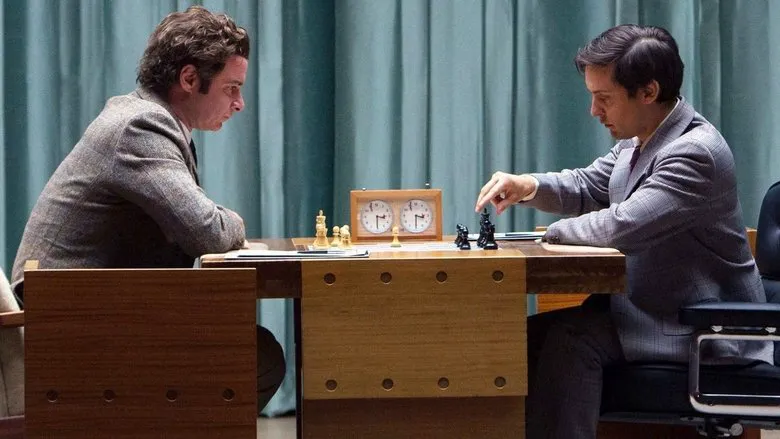 .jpg “Scene from “Pawn Sacrifice””)
.jpg “Scene from “Pawn Sacrifice””)
Like Bobby Fischer, Boris Spassky was a chess prodigy. It took him only a year in a chess club to achieve the first-rank norm at the age of 10, a record for the USSR at the time.
Echoes of Rocky IV on the Chessboard
Do you enjoy “Rocky IV”? Do you rewatch its climactic fight, where the American champion defeats the Soviet boxer? Does it bother you that Stallone’s film plays against us, portraying its hero in a much more favorable light than his opponent? If so, you might appreciate Edward Zwick’s (“The Last Samurai”) sports-psychological drama, as it is essentially a chess version of “Rocky IV” – albeit a more intelligent one, based on real events rather than the idle fiction of screenwriters.
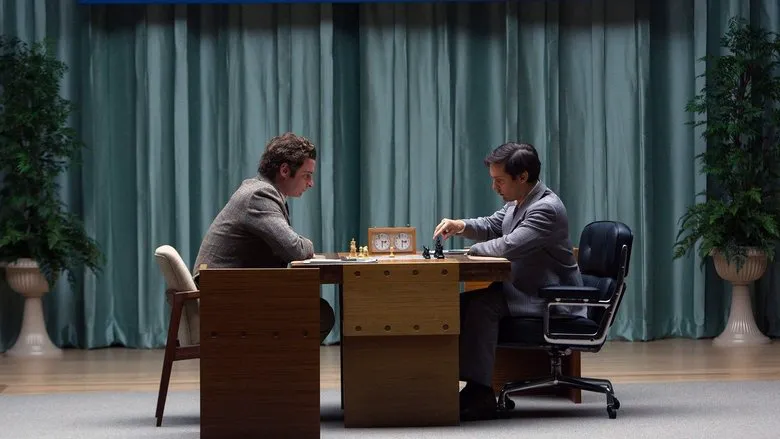
Contrary to what is shown in the film, Fischer and Spassky’s games were not broadcast live on American TV. Anchors received news of the games’ progress via teletype and analyzed the board situations with chess experts.
Contrasting Portrayals: American Underdog vs. Soviet Machine
To understand Zwick’s inspiration, consider how he presents “his” and “our” grandmasters. Liev Schreiber often plays powerful action heroes, and when his Spassky appears on screen, he looks less like a “nerd” chess player and more like Schwarzenegger in “The Terminator” – a powerful body, confident gait, eyes hidden behind dark glasses. The “Terminator” aspect of Fischer’s opponent is emphasized in subsequent scenes, and Spassky only shows his humanity at the very end of the film, when the American David overwhelms the Soviet Goliath. “The champion is faltering,” viewers understand. “His defeat is inevitable. The Soviet chess machine has broken down!” And while the film regularly shows Fischer’s mother and sister watching the decisive games on television, Spassky’s family is never seen. Can a Terminator have relatives?
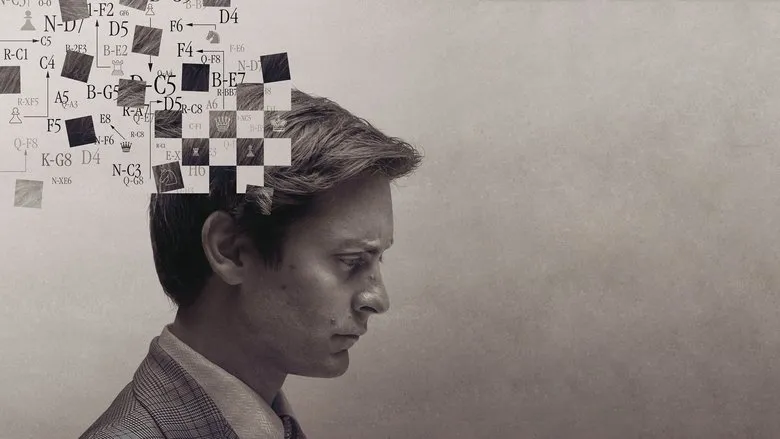 .jpg “Scene from “Pawn Sacrifice””)
.jpg “Scene from “Pawn Sacrifice””)
In contrast, Fischer’s humanity and weakness are almost the main focus of the film. From the earliest scenes, we see a gifted but autistic and unkempt individual, unable to maintain warm relationships even with his closest relatives and completely obsessed with chess because he is incapable of anything else. The film seems to say to viewers: “Just imagine how difficult it is to live in complete emotional isolation and suffer from paranoia and sensitivity to things that others don’t even notice!” However, Fischer is a much less charming character than Sheldon Cooper from “The Big Bang Theory,” who suffers from a similar mental disorder. But the film asks us not to love this grumpy and capricious anti-Semite (even though Fischer himself was Jewish), but to pity him – and to admire the fact that, despite all his “quirks,” he could play chess at a championship level. Although, in between games, he sometimes behaved almost as insanely as the main character of “The Aviator” in his darkest moments.
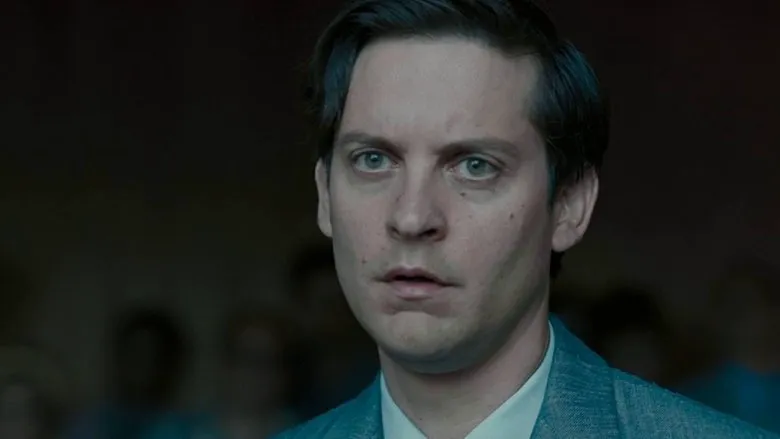 .jpg “Scene from “Pawn Sacrifice””)
.jpg “Scene from “Pawn Sacrifice””)
The “Brooklyn Boy” Narrative: A Questionable Contrast
Perhaps the most absurd aspect of the on-screen confrontation between Fischer and Spassky is how often the film repeats the words “Brooklyn boy” (i.e., not from the American elite). What, was Spassky born in a princely palace? His childhood was harder than Fischer’s. He survived the Great Patriotic War, and his family almost died in besieged Leningrad. After the war, his single mother fed three children soup made from potato peelings, while Fischer’s mother, also a single mother, hosted “social” receptions. Who is the aristocrat after that? But, of course, Zwick doesn’t mention the trials that Spassky went through. Instead, he focuses on the fact that when Soviet chess players were brought to the United States, they were housed in better hotels than Fischer could afford.
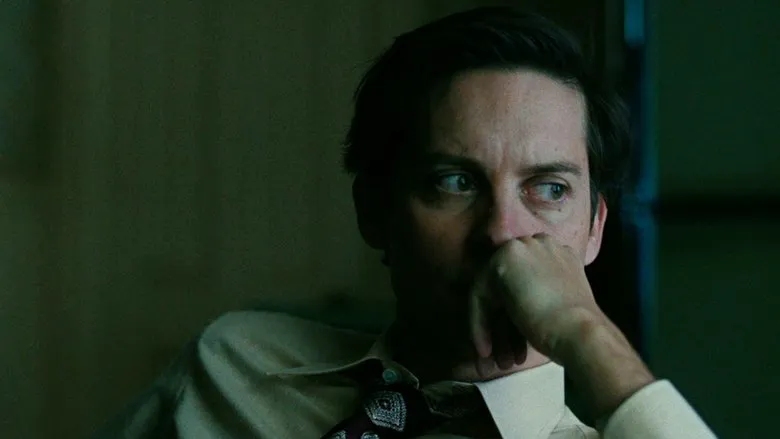 .jpg “Scene from “Pawn Sacrifice””)
.jpg “Scene from “Pawn Sacrifice””)
A Respectable Portrayal, Despite the Bias
To the film’s credit, Zwick proves what he sets out to prove, and Maguire’s character is presented as deserving of respect and worthy of victory. In addition, the film entertains viewers with tragicomic moments from the life of an eccentric autistic-paranoid (such a character can turn even a trip to the airport into a show) and convincingly outlines the chess fever of 1972, when the “match of the century” between representatives of the superpowers was watched with delight even by those who had never held a chess piece before. The depiction of the chess games is also commendable – the film doesn’t even try to show and explain the playing greatness of Fischer and Spassky (this would require a multi-hour digression into chess theory), but the emotional reactions of the coaches of both grandmasters are enough to give viewers an understanding of when the heroes are jumping above their heads.
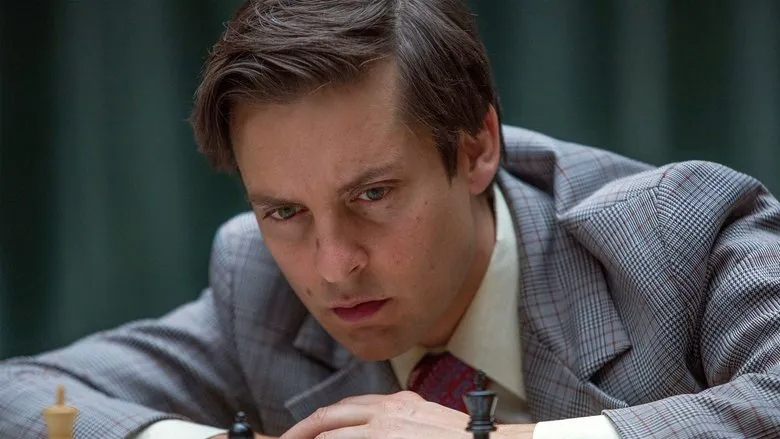
Finally, as a dessert, “Pawn Sacrifice” reminds us that Fischer’s paranoia was not completely unjustified and that both great chess players lived under the close supervision of intelligence agencies. After all, the results of their match in the context of the Cold War were given not only sporting but also political significance. This is what the title of the film refers to – by “pawn,” Zwick means Fischer, who, like a chess piece, was played by American politicians interested in victory over the USSR (understandably, Spassky was in exactly the same situation).
A Film for Sports Enthusiasts, With a Caveat
And yet, “Pawn Sacrifice” is a film strictly for sports enthusiasts. And not for domestic enthusiasts, since the film is too American-centric and Fischer-centric for us. But if, as already mentioned, this doesn’t bother you and you are interested in the American side of the chess confrontation of 1972, then Zwick’s funny, dramatic, and tragic film (Fischer won the match but lost his life, since after winning the championship, paranoia completely took over him) may well appeal to you. There is something to appreciate in it for moviegoers as well – Maguire and Schreiber, and all the other actors, are impeccable in their roles, and the film is much more dynamic and exciting than films where the characters either talk or move pieces. And, of course, we must thank Zwick for the fact that there is no “klyukva” (stereotypical and often derogatory portrayal of Russia) and primitive anti-Sovietism in his film. “Pawn Sacrifice” is not the film we would have liked to see on the topic touched upon by the director, but it could have been much, much worse.